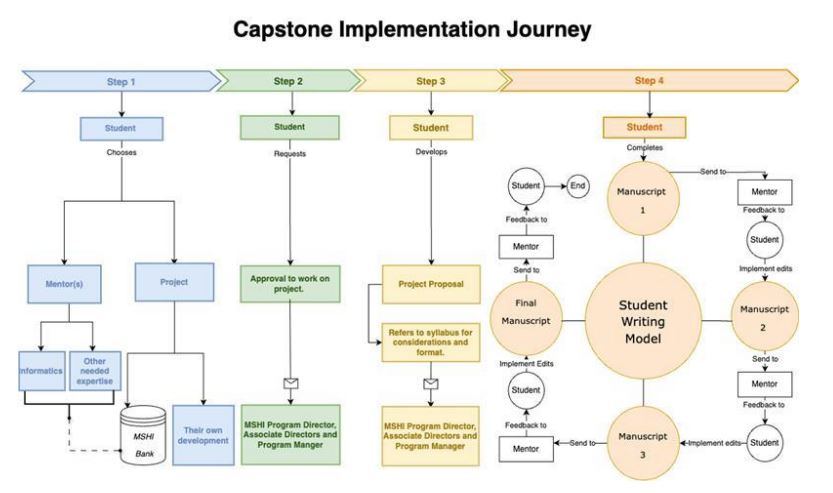Health Informatics Capstone
Capstone Implementation in Health Informatics
Students enrolled in the Master of Science in Health Informatics program at UT Southwestern Medical Center are required to select a project of interest in which to apply the knowledge and skills acquired during their coursework through participation in a structured academic experience.
This course provides hands-on, real-world experience in a professional setting. Students will work under the supervision of a professional with experience in health informatics and/or a related discipline and will receive ongoing guidance from a UT Southwestern Health Informatics mentor.
Capstone Requirements for Graduation
Overview of the Capstone Implementation Journey
The capstone paper represents the culmination of the Capstone Implementation Course (HI 5500), which may extend one to three semesters. Graduation eligibility is contingent upon successful completion and presentation of the capstone project, with final approval from the student’s UT Southwestern Health Informatics mentor.
The capstone journey unfolds in four key stages. Initially, by completing the capstone project plan (HI 5100) guiding students from concept to completion. First, students select a problem to address (project) either from our curated project bank or of their own design and identify mentors and stakeholders in health informatics and related disciplines to support their work. This selection and mentoring phase occur simultaneously.
Next, students formally notify the Program Directors, Associate Directors and Program Manager of the Master of Science in Health Informatics, by submitting their proposed project for approval. Upon approval, they collaborate closely with their mentors to develop key deliverables, culminating in a detailed project proposal submitted to the Program Director, Associate Directors and Program Manager.
Following this, students engage in an iterative writing process crafting multiple drafts of their manuscript under the guidance of their mentors, refining their work with each revision. The experience culminates in a final manuscript and a formal presentation of their findings and interventions, shared with faculty and peers in a scholarly forum (See figure below).

The capstone project is a comprehensive and integrative research and practice experience. It reflects synthesis of the program’s academic content and the student’s ability to apply advanced knowledge and informatics skills in real-world health settings, with a focus on improving outcomes for patients, families, populations, or healthcare systems.
Capstone Paper Structure
The final Capstone Paper should include the following sections:
- Cover page
- Abstract (300 words)
- Introduction
- Hypothesis (If any)
- Objectives
- Methods
- Results
- Discussion
- Conclusion
- References (JAMA style)
- Acknowledgments
Capstone Goals and Objectives
This experience is designed to immerse students in the work of developing or applying health informatics tools and approaches to address real-world healthcare needs. Goals and objectives should be jointly developed and agreed upon by the student and Health Informatics Mentor.
Student Expectations
Students are expected to demonstrate professionalism, initiative, and accountability throughout the capstone experience. Specifically, students should:
- Proactively schedule and attend regular meetings with their mentors.
- Follow all instructions and timelines provided by mentors, faculty, and program staff.
- Consistently document their progress through project logs, drafts, and milestone tracking.
- Work independently to meet established deliverables and project goals.
- Seek and incorporate feedback constructively to improve the quality of their work.
- Communicate clearly and respectfully with all stakeholders involved in the project.
- Uphold ethical standards in research, data use, and collaboration.
- Demonstrate critical thinking, problem-solving, and adaptability in addressing project challenges.
- Manage their time effectively to balance practicum responsibilities with other academic commitments.
Master of Science in Health Informatics Mentors and Their Roles
Mentor Type: Health Informatics Mentor
Area of Expertise: Health Informatics, Clinical Informatics, or Biomedical Informatics
Role Description:
- Provide ongoing guidance throughout the capstone planning and implementation
- Review and provide detailed feedback on all manuscript drafts
- Approve the project proposal
- Ensure alignment with informatics principles and program goals
- Meets regularly with students to review their progress
Mentor Type: Mentor from Related Discipline
Area of Expertise: Clinical specialty, software development, data science, engineering, public health, or another relevant domain depending on the project’s focus
Role Description:
- Offer specialized guidance within their area of expertise
- Support the student during implementation of domain-specific tasks
- Help contextualize the project within the discipline
- Meets regularly with students to review their progress
Contact Information
Jonathan Reeded, M.D.
jonathan.reeder@utsouthwestern.edu
Catherine Chen, M.D., M.S.H.I
catherine.chen@utsouthwestern.edu
Estefanie Garduno Rapp, M.D., M.S.H.I.
nelly.gardunorapp@utsouthwestern.edu
